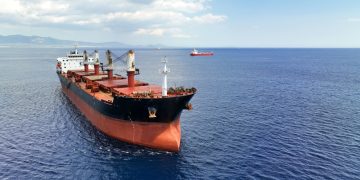Climate NGOs urge for the UK government to get on board and confirm its participation in the North Atlantic Emission Control Area.
A study recently published by the International Council on Clean Transportation (ICCT) assessed the potential for reducing emissions from ships in the North Atlantic Ocean by designating the region an Emission Control Area. The North Atlantic Emission Control Area (AtlECA) would impose stricter regulations aimed at reducing emissions.
According to the study, in 2030, if distillate fuel is used to comply with the ECA regulations, this could lead to an 82% reduction in SOx emissions, a 64% reduction in PM2.5, and a 36% reduction in black carbon (BC) emissions when compared to a scenario without ECA regulations. NOx regulation Tier III standards can reduce expected NOx emissions by about 3% if they apply only to ships built in 2027 or later. Up to 71% NOx reductions could be achieved by applying Tier III standards to engines on all ships.
According to Opportunity Green if adopted, the proposed North Atlantic Emissions Control Area could be the world’s largest ECA, covering waters as far north as Greenland to as far south as Spain. ICCT has recommended that the Atlantic ECA member states should include the full exclusive economic zones of Spain, Portugal, France, the United Kingdom, Ireland, Iceland, Faroe Islands, and Greenland in the geographic scope of the AtlECA. This would strategically connect the surrounding established or proposed ECAs, creating the largest low-emission shipping zone in the world.
An ECA currently exists in UK waters to the east and south in the English Channel and the North Sea, in which a sulphur cap of 0.1% and a NOx limit for newbuild ships (built after 2021) apply. In March this year, Opportunity Green, along with Transport & Environment, Green Alliance, the Nature and Biodiversity Conservation Union (NABU), Fundación Ecología y Desarrollo ECODES, ZERO, and the Clean Arctic Alliance, called on the UK government to extend the North Sea and English Channel ECA in UK waters.
With such strong evidence that stricter regulations would reduce these harmful emissions, this is a key moment for the UK government. Confirming its support for the North Atlantic ECA would not only show commitment to public health and marine biodiversity but also enable them to lead on ambitious air pollution prevention and shipping decarbonisation policies.
… said Blánaid Sheeran, Policy Officer at Opportunity Green
Recommendations
Based on this analysis, ICCT suggests the Atlantic ECA member states consider the following recommendations:
- Include the full exclusive economic zones of Spain, Portugal, France, the United Kingdom, Ireland, Iceland, Faroe Islands, and Greenland in the geographic scope of the AtlECA. This would strategically connect the surrounding established or proposed ECAs, creating the largest low-emission shipping zone in the world.
- Consider including the outermost regions of Portugal (Azores and Madeira) and Spain (Canary Islands) in the geographic scope of the AtlECA. Our analysis shows that 94% of the traffic crossing these islands is already shipping in other existing or proposed Emission Control Areas.
- Incentivize the use of distillates over ultra-low sulfur fuel oil (ULSFO) or scrubbers for ECA compliance in the national waters of AtlECA member states.
- Consider restricting the use of scrubbers in the national waters and ports of AtlECA member states to reduce BC and PM and to avoid scrubber discharges.
- Consider supporting Norway’s suggestion to amend MARPOL to use the “three dates criteria” for the designation of newly built ships subject to Tier III NOx emission standards.
As well as extending the ECA to all UK waters, the NGOs urged UK government to collaborate with neighbouring coastal states to establish an ECA beyond UK waters. If expanded in this way, it would enable to UK to link up into the proposed North Atlantic ECA.
A North Atlantic ECA would lead to impressive emissions reductions. This is an especially important topic for the new UK government as UK waters experience heavy shipping traffic and are in the top three most-polluted North-Atlantic coastal states.”
… commented Lord Deben, former Chair of the UK’s Climate Change Committee


































































